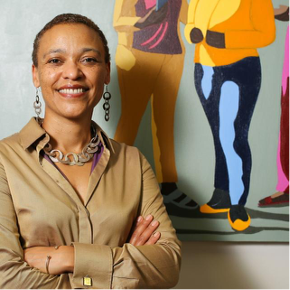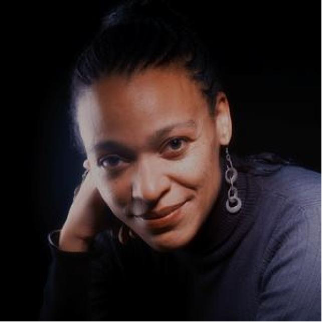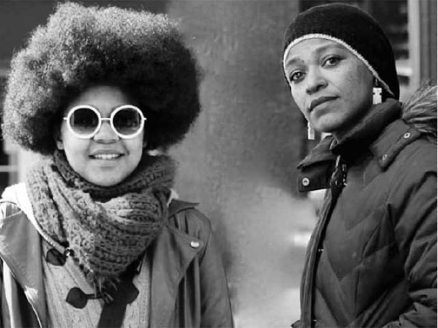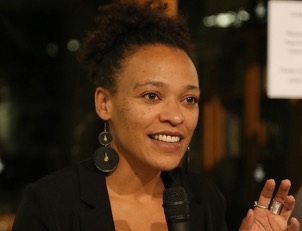Profile

Shose Kessi
Birth:
1973
Training Location(s):
PhD, London School of Economics (LSE) (2010)
MA, London School of Economics (LSE) (2005)
BA, SOAS, University of London (1995)
Primary Affiliation(s):
Dean, Faculty of Humanities, University of Cape Town (2019–present)
Co-Director, Hub for Decolonial Feminist Psychologies of Africa, University of Cape Town (2018–present)
Deputy Dean of Transformation, University of Cape Town (2018–2018)
Chair, Humanities Transformation Committee, University of Cape Town (2016–2016)
Psychology’s Feminist Voices Oral History Interview:
Other Media:
Career Focus:
Political psychology; decoloniality; social change; social identity; community-based research; participatory research; qualitative research; Pan-Africanism; photovoice
Biography
Shose Kessi was born in Ann Arbor, Michigan, but grew up in Geneva, Switzerland, where her father worked for the United Nations. Her mother, a member of the Quaker United Nations Office (QUNO), was involved in the anti-apartheid movement and “... involved [Kessi] in all the activist work she was doing”. It was this early exposure to international politics and social activism that shaped her evolving commitments to issues of gender, race, and power. Growing up as one of the few Black families in her predominantly white Geneva neighbourhood, Dr. Kessi quickly developed an acute awareness of race: “It started more as a consciousness of being Black”, she explains, “but it evolved into a consciousness of feminism at the same time, because obviously these things intersect”.
After finishing her undergraduate degree at the School of Oriental and African Studies (formerly University of London), where she studied economics and Swahili, Dr. Kessi began working for the Women’s Development Foundation in South Africa. “That was the first time I encountered, in my work life, issues relating to women and women's empowerment”, she recalls. Kessi went on to work at several non-governmental organizations (NGOs) focused on the advancement of women’s empowerment and reproductive health, such as the International HIV/AIDS Alliance based in the United Kingdom, and Jhpiego at John Hopkins University in the United States.
Despite her enduring commitment to these causes, Dr. Kessi grew disillusioned with her involvement in the NGO sector: “It was very frustrating to me… understanding the whole development context, aid context … and how we were positioned in it”. Intent on putting her experiences into critical context, Dr. Kessi returned to school to pursue graduate studies. While she initially began a master’s in population studies, Dr. Kessi found herself dissatisfied with the theoretical frameworks being taught and their ability to represent or address the structural issues she had encountered in her work.
A chance encounter with a friend studying social psychology opened a new academic path, where — after some research — Dr. Kessi switched programs to pursue a master’s and doctorate in social and organizational psychology at the London School of Economics (LSE). Her graduate work focused on racism within the development sector, specifically how racialized women were consistently portrayed as passive recipients of aid, rather than as active agents in their own lives. This work became pivotal to her understanding of the intersections of race and gender, offering important scaffolding for her scholarly focus on decolonial feminist psychology.
After completing her PhD in 2010, Dr. Kessi joined the Department of Psychology at the University of Cape Town (UCT) in 2011, during a time of intense debate around affirmative action measures. Her research with Black students, using the participatory method of photovoice, documented experiences of exclusion and racism on campus. One of the stories produced by students involved the white supremacist legacy of the Cecil Rhodes statue on campus, which became part of the broader Rhodes Must Fall movement to decolonize education across South Africa.
Drawing connections between her own difficulties navigating institutional racism and the student organizing she witnessed, Kessi was motivated to develop stronger support networks. She founded the UCT Black Academic Caucus, was appointed to the Special Executive Task Team (SETT), where she liaised between students and the university executive team, and served as Chair and Deputy Dean of the Humanities Transformation Committee in 2016 and 2018, respectively.
In 2018, Dr. Kessi and her colleague, Dr. Floretta Boonzaier, founded the Hub for Decolonial Feminist Psychologies in Africa at UCT, a research and activist space for supporting academic engagement with decolonial feminist praxis. When speaking about her intentions behind the Hub, Dr. Kessi explains: “When you feel like you belong somewhere, you can feel comfortable. You're more confident, your self-esteem is higher and so you're more likely to perform well”. She wanted the space to cultivate a sense of belonging and home: “It’s like somebody’s living room… where they hang out and feel comfortable with their family. So that was a very conscious decision”.
In 2019, Dr. Kessi was appointed Dean of the Faculty of Humanities. However, her experiences in university governance have not been without opposition: “To be completely honest, I’ve had difficulties with everybody”, she admits, “Even Black women who consider themselves feminists sometimes do unfeminist things. It’s not an easy space to occupy”. Despite these professional and institutional challenges, she comments: “I try to lead from behind and adopt multiple types of strategies… it's not about being loud… being loud is exhausting and you don’t last very long”.
For students and early career scholars interested in decolonial feminist psychology, she offers the following advice: “Remember that you belong there as much as anybody else. Networks of solidarity are so crucial”, and that “decolonial work or social change work happens through action… it doesn't happen in our heads”.
By Danielle Christie (2025)
To cite this article, see Credits
Selected Works
Cornell, J., Hearn, J., Ratele, K., & Kessi, S. (2023). Sexual justice and sexualities. In Handbook of social sciences and global public health (pp. 1841–1861). Springer International Publishing.
Cornell, J., Kessi, S., Ratele, K. (2022). Examining the dynamics of belonging and alienation in higher education through Photovoice. Health Promotion Practice, 23(2), 325–330.
Kessi, S., Boonzaier, F., & Gekeler, B. S. (2021). Pan-Africanism and psychology in decolonial times. Palgrave Macmillan.
Kessi, S., Marks, Z., & Ramugondo, E. (2020). Decolonizing African Studies. Critical African Studies, 12(3), 271–282.
Kessi, S. (2019). Towards a Decolonial Psychology: Defining and Confining Symbols of the Past. Museum International, 71(1–2), 80–87.
Kessi, S., & Boonzaier, F. (2018). Centre/ing decolonial feminist psychology in Africa. South African Journal of Psychology, 48(3), 299–309.
Kessi, S. (2017). Community social psychologies for decoloniality: An African perspective on epistemic justice in higher education. South African Journal of Psychology, 47(4), 506–516.
Kessi, S., & Boonzaier, F. (2017). Resistance and transformation in postcolonial contexts. In C. Howarth & E. Andreouli (Eds.), The social psychology of everyday politics (pp. 116–130). Routledge/Taylor & Francis Group.
Cornell, J., & Kessi, S. (2016). Black students’ experiences of transformation at a previously “white only” South African university: A photovoice study. Ethnic and Racial Studies, 40(11), 1882–1899.
Kessi, S., & Cornell, J. (2015). Coming to UCT: Black students, transformation and discourses of race. Journal of Student Affairs in Africa, 3(2), 1–16.
Kessi, S. (2013). Re politicizing race in community development: Using postcolonial psychology and Photovoice methods for social change. PINS – Psychology in Society, 45(2), 17–35.
Kessi, S. (2013). Transforming historically white universities: Students and the politics of racial representation. New Agenda: South African Journal of Economic and Social Policy, 50, 53–57.
Kessi, S. (2011). Photovoice as a practice of re-presentation and social solidarity: Experiences from a youth empowerment project in Dar es Salaam and Soweto. Papers on social representations, 20(1), 7–1.
Photo Gallery




Shose Kessi
Birth:
1973
Training Location(s):
PhD, London School of Economics (LSE) (2010)
MA, London School of Economics (LSE) (2005)
BA, SOAS, University of London (1995)
Primary Affiliation(s):
Dean, Faculty of Humanities, University of Cape Town (2019–present)
Co-Director, Hub for Decolonial Feminist Psychologies of Africa, University of Cape Town (2018–present)
Deputy Dean of Transformation, University of Cape Town (2018–2018)
Chair, Humanities Transformation Committee, University of Cape Town (2016–2016)
Psychology’s Feminist Voices Oral History Interview:
Other Media:
Career Focus:
Political psychology; decoloniality; social change; social identity; community-based research; participatory research; qualitative research; Pan-Africanism; photovoice
Biography
Shose Kessi was born in Ann Arbor, Michigan, but grew up in Geneva, Switzerland, where her father worked for the United Nations. Her mother, a member of the Quaker United Nations Office (QUNO), was involved in the anti-apartheid movement and “... involved [Kessi] in all the activist work she was doing”. It was this early exposure to international politics and social activism that shaped her evolving commitments to issues of gender, race, and power. Growing up as one of the few Black families in her predominantly white Geneva neighbourhood, Dr. Kessi quickly developed an acute awareness of race: “It started more as a consciousness of being Black”, she explains, “but it evolved into a consciousness of feminism at the same time, because obviously these things intersect”.
After finishing her undergraduate degree at the School of Oriental and African Studies (formerly University of London), where she studied economics and Swahili, Dr. Kessi began working for the Women’s Development Foundation in South Africa. “That was the first time I encountered, in my work life, issues relating to women and women's empowerment”, she recalls. Kessi went on to work at several non-governmental organizations (NGOs) focused on the advancement of women’s empowerment and reproductive health, such as the International HIV/AIDS Alliance based in the United Kingdom, and Jhpiego at John Hopkins University in the United States.
Despite her enduring commitment to these causes, Dr. Kessi grew disillusioned with her involvement in the NGO sector: “It was very frustrating to me… understanding the whole development context, aid context … and how we were positioned in it”. Intent on putting her experiences into critical context, Dr. Kessi returned to school to pursue graduate studies. While she initially began a master’s in population studies, Dr. Kessi found herself dissatisfied with the theoretical frameworks being taught and their ability to represent or address the structural issues she had encountered in her work.
A chance encounter with a friend studying social psychology opened a new academic path, where — after some research — Dr. Kessi switched programs to pursue a master’s and doctorate in social and organizational psychology at the London School of Economics (LSE). Her graduate work focused on racism within the development sector, specifically how racialized women were consistently portrayed as passive recipients of aid, rather than as active agents in their own lives. This work became pivotal to her understanding of the intersections of race and gender, offering important scaffolding for her scholarly focus on decolonial feminist psychology.
After completing her PhD in 2010, Dr. Kessi joined the Department of Psychology at the University of Cape Town (UCT) in 2011, during a time of intense debate around affirmative action measures. Her research with Black students, using the participatory method of photovoice, documented experiences of exclusion and racism on campus. One of the stories produced by students involved the white supremacist legacy of the Cecil Rhodes statue on campus, which became part of the broader Rhodes Must Fall movement to decolonize education across South Africa.
Drawing connections between her own difficulties navigating institutional racism and the student organizing she witnessed, Kessi was motivated to develop stronger support networks. She founded the UCT Black Academic Caucus, was appointed to the Special Executive Task Team (SETT), where she liaised between students and the university executive team, and served as Chair and Deputy Dean of the Humanities Transformation Committee in 2016 and 2018, respectively.
In 2018, Dr. Kessi and her colleague, Dr. Floretta Boonzaier, founded the Hub for Decolonial Feminist Psychologies in Africa at UCT, a research and activist space for supporting academic engagement with decolonial feminist praxis. When speaking about her intentions behind the Hub, Dr. Kessi explains: “When you feel like you belong somewhere, you can feel comfortable. You're more confident, your self-esteem is higher and so you're more likely to perform well”. She wanted the space to cultivate a sense of belonging and home: “It’s like somebody’s living room… where they hang out and feel comfortable with their family. So that was a very conscious decision”.
In 2019, Dr. Kessi was appointed Dean of the Faculty of Humanities. However, her experiences in university governance have not been without opposition: “To be completely honest, I’ve had difficulties with everybody”, she admits, “Even Black women who consider themselves feminists sometimes do unfeminist things. It’s not an easy space to occupy”. Despite these professional and institutional challenges, she comments: “I try to lead from behind and adopt multiple types of strategies… it's not about being loud… being loud is exhausting and you don’t last very long”.
For students and early career scholars interested in decolonial feminist psychology, she offers the following advice: “Remember that you belong there as much as anybody else. Networks of solidarity are so crucial”, and that “decolonial work or social change work happens through action… it doesn't happen in our heads”.
By Danielle Christie (2025)
To cite this article, see Credits
Selected Works
Cornell, J., Hearn, J., Ratele, K., & Kessi, S. (2023). Sexual justice and sexualities. In Handbook of social sciences and global public health (pp. 1841–1861). Springer International Publishing.
Cornell, J., Kessi, S., Ratele, K. (2022). Examining the dynamics of belonging and alienation in higher education through Photovoice. Health Promotion Practice, 23(2), 325–330.
Kessi, S., Boonzaier, F., & Gekeler, B. S. (2021). Pan-Africanism and psychology in decolonial times. Palgrave Macmillan.
Kessi, S., Marks, Z., & Ramugondo, E. (2020). Decolonizing African Studies. Critical African Studies, 12(3), 271–282.
Kessi, S. (2019). Towards a Decolonial Psychology: Defining and Confining Symbols of the Past. Museum International, 71(1–2), 80–87.
Kessi, S., & Boonzaier, F. (2018). Centre/ing decolonial feminist psychology in Africa. South African Journal of Psychology, 48(3), 299–309.
Kessi, S. (2017). Community social psychologies for decoloniality: An African perspective on epistemic justice in higher education. South African Journal of Psychology, 47(4), 506–516.
Kessi, S., & Boonzaier, F. (2017). Resistance and transformation in postcolonial contexts. In C. Howarth & E. Andreouli (Eds.), The social psychology of everyday politics (pp. 116–130). Routledge/Taylor & Francis Group.
Cornell, J., & Kessi, S. (2016). Black students’ experiences of transformation at a previously “white only” South African university: A photovoice study. Ethnic and Racial Studies, 40(11), 1882–1899.
Kessi, S., & Cornell, J. (2015). Coming to UCT: Black students, transformation and discourses of race. Journal of Student Affairs in Africa, 3(2), 1–16.
Kessi, S. (2013). Re politicizing race in community development: Using postcolonial psychology and Photovoice methods for social change. PINS – Psychology in Society, 45(2), 17–35.
Kessi, S. (2013). Transforming historically white universities: Students and the politics of racial representation. New Agenda: South African Journal of Economic and Social Policy, 50, 53–57.
Kessi, S. (2011). Photovoice as a practice of re-presentation and social solidarity: Experiences from a youth empowerment project in Dar es Salaam and Soweto. Papers on social representations, 20(1), 7–1.



